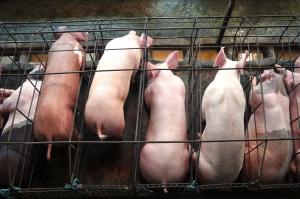Pork Industry Leaders and Political Allies Were Wrong to Say Prop 12 Was Unconstitutional. Now Their Policy Prescription Is Wrong for America
— Wayne Pacelle
WASHINGTON DC, UNITED STATES, June 15, 2023/EINPresswire.com/ — Animal Wellness Action and the Center for a Humane Economy are calling on Congress to reject the EATS Act, a sweeping bill that would nullify more than 1,000 state laws that placed democratically approved standards on agricultural commerce, including Prop 12 in California and Amendment 3 in Massachusetts. The EATS Act is a “hair on fire” overreaction to the two constitutionally enacted state laws that provide space for breeding pigs to turn around, stand up and lie down, the groups say.
“The increasingly diversified pork industry is already deep into the transition away from gestation crates and toward group housing,” said Dr. Tom Pool, senior veterinarian for the Center for a Humane Economy. “Group housing is already the setting for 40 percent of the nation’s 6 million breeding sows, and California and Massachusetts represent perhaps just 8 to 10 percent of the market for U.S.-produced pork. Pig producers have the California and Massachusetts markets covered.” Dr. Pool, a former commander of the U.S. Army Veterinary Command, grew up on his family’s 100-year-old cattle ranch in rural southwest Oklahoma.
There are thousands upon thousands of rank-and-file farmers who don’t use gestation crates. A number of major producers, including Tyson, Hormel, and Clemens Groups, have said they’re already prepped to meet the more specifications for California and Massachusetts.
The EATS Act, which according to news reports will be introduced by about 10 Republicans Senators today, would strip away the ability of state or local governments to regulate the preharvest production of agricultural products in commerce, with “agricultural products including agricultural, horticultural, viticultural, and dairy products, livestock and poultry, bees, forest products, fish and shellfish, and any products thereof, . . .”
“The EATS Act, would nullify any state or local law that places any kind of standard, regardless of its impact, on agricultural exchange, whether grounded on concerns about animal welfare, food safety, chemicals, agricultural pests, or worker safety,” said Scott Edwards, general counsel for Animal Wellness Action and the Center for a Humane Economy.
The EATS Act is just the latest political reaction to the successful movement to end the use of extreme confinement methods for sow housing in the United States. In May, the National Pork Producers Council came out on the losing end of a U.S. Supreme Court challenge to California’s Prop 12, with Associate Justice Neil Gorsuch writing an opinion determining that the California law is constitutional because it is fairly applied, that any economic impacts on out-of-state producers were purely speculative, and it reflects core social and scientific values related to the humane treatment of animals and food safety. He was joined by Justices Thomas, Coney Barrett, Sotomayor, and Kagan.
“The hair-on-fire complaints by the Pork Producers Council are more about ideology than supply chain issues,” said Wayne Pacelle, president of Animal Wellness Action and the Center for a Humane Economy and a key architect of the Prop 12 and Massachusetts’ Amendment 3. “The California and Massachusetts laws provide an incredible market opportunity for thousands of pig and egg farmers who have already invested billions in more extensive housing systems. Congress would damage not only democratic decision-making in the United States but the livelihoods of many farmers by passing this overreaching and reckless effort to place all agricultural policy in the hands of the federal government.”
The EATS Act:
Violates the 10th Amendment, by denying duly elected and appointed officials the right to enact common-sense standards relating to agricultural commerce, disrespecting constitutional protections of limited government and states’ rights.
Undermines state animal welfare standards, by attempting to prolong the use of deeply unpopular and inhumane gestation crates. Voters have approved five of five ballot measures on anti-confinement, each by double digits. More than 60 of the biggest names in food retail, including McDonald’s, Costco, and Walmart, have policies opposing extreme confinement of sows in gestation crates.
Denies markets to thousands of pig and egg farmers who have collectively invested billions in more extensive housing systems and are excited about the ability to sell their products in California and Massachusetts. The egg industry has already invested $6 billion in new cage-free housing. Thousands of pig producers are ready to supply California and Massachusetts today, and the EATS would gut their markets and force many of them out of business.
Allows the Chinese government to drive U.S. agriculture policy. Chinese-controlled pork companies operating in even a single state could force their pork on other states, even if there were no standards observed at all. The EATS Act, in that sense, allows the values of Chinese leaders running U.S. businesses in our country to hold more sway than the democratically expressed values of American consumers, including in our number one agricultural state of California.
Americans in California and Massachusetts consume just about 8 to 10 percent of pork produced in the United States, when factoring in massive exports to China, Japan, and other countries that have zero animal-welfare standards. Tyson Foods, Hormel, Seaboard, Clemens Group, Perdue, and other major producers have said they can readily meet the standards of California and Massachusetts, as have thousands of family-scale producers.
Congress turned back amendments nearly identical to the EATS Act on the 2014 and 2018 Farm bills.
ABOUT
Animal Wellness Action is a Washington, D.C.-based 501(c)(4) whose mission is to help animals by promoting laws and regulations at federal, state and local levels that forbid cruelty to all animals. The group also works to enforce existing anti-cruelty and wildlife protection laws. Animal Wellness Action believes helping animals helps us all. Twitter: @AWAction_News
Center for a Humane Economy is a Washington, D.C.-based 501(c)(3) whose mission is to help animals by helping forge a more humane economic order. The first organization of its kind in the animal protection movement, the Center encourages businesses to honor their social responsibilities in a culture where consumers, investors, and other key stakeholders abhor cruelty and the degradation of the environment and embrace innovation as a means of eliminating both. The Center believes helping animals helps us all. Twitter: @TheHumaneCenter
Wayne Pacelle Pacelle
Animal Wellness Action
+1 7202559831
email us here
Visit us on social media:
Facebook
Twitter
![]()
Originally published at https://www.einpresswire.com/article/639683344/new-bill-would-gut-1k-state-ag-laws-deny-markets-to-farmers-ready-for-prop-12





